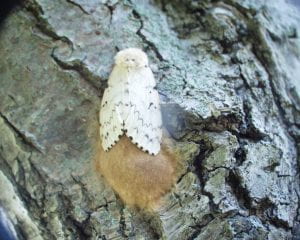
Last summer, this invasive pest chewed up trees across the Hudson Valley and beyond. Will this happen again in 2024? Will defoliated trees recover? Can we do anything to protect our trees and forests? Experts will discuss where it came from, and what happens next.
On Thursday, January 11 at 7pm ET, Cary Institute of Ecosystem Studies will host a presentation on spongy moths, an invasive forest pest that has recently resurged. Outbreaks of very hungry caterpillars have defoliated trees in the Hudson Valley and beyond.
This event will feature Cary scientists Clive Jones and Charles Canham, who bring deep expertise on the topic. Jones studied the spongy moth for 30 years as part of a long-term project on Cary’s 2,000-acre research campus. Canham has been researching the ecology of Northeastern forests for 40 years.
Spongy moth caterpillars prefer to feed on oak trees but will defoliate a wide variety of deciduous species, and sometimes conifers. Learn where the spongy moth came from, how it was introduced, how it spread, and the history of outbreaks and defoliation in the US. Discover how outbreaks get started and why they collapse. Find out about forest pest impacts now and in the future.
Free and open to all, this hybrid event will feature time for Q&A. Participants are encouraged to submit questions in advance during registration, so they can be woven into the presentation.
Register here for in-person seating at the Lovejoy Auditorium in Millbrook, NY.
Register for virtual access.


